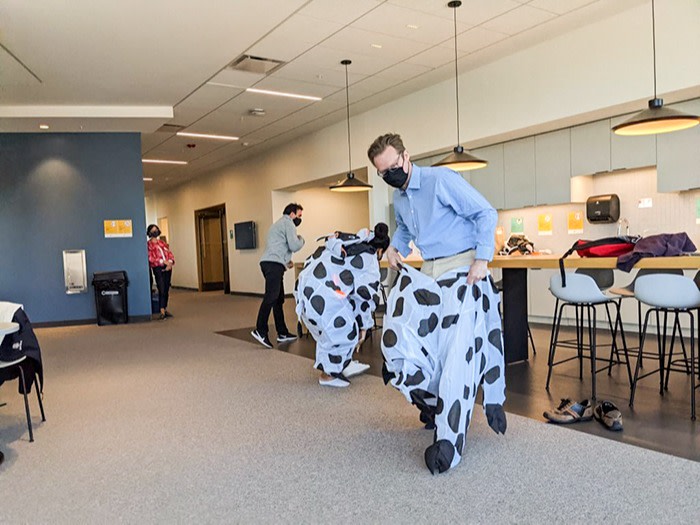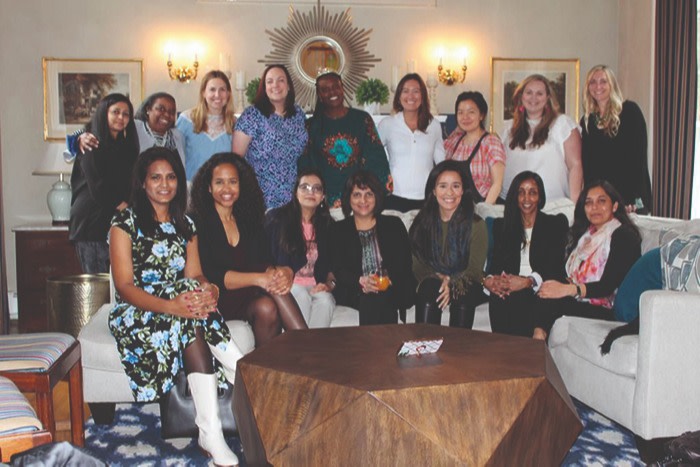Pandemics, people power and ‘pitchforks’ on an executive MBA

Roula Khalaf, Editor of the FT, selects her favourite stories in this weekly newsletter.
Five months after graduation in Providence, Rhode Island, my executive MBA classmates are still hard at it: being a positive force in each others’ lives. Look no further than the chirruping on the WhatsApp group. At first, I found it millennial. Then it dawned on me that I was part of a highly diverse, life-affirming community that was changing me for the better.
I had not expected this when I enrolled on the EMBA, which is run jointly by IE Business School in Madrid and Brown University in the US. I was there to brush up on financial management.
Unexpectedly, Covid’s lockdowns and enforced digital learning stoked an irrepressible human desire to connect. The alumni network, vulcanised by 28 exacting courses and 268 sessions across time zones, is already more enduring than teachings about leveraged buyouts and the rise of Walmart. Sure, business today is shaped by technology and companies such as Amazon and Apple. Ours is the era of digital transformation. Yet my studies were a reminder that business is about relationships with people, not simply transactions.
Nimble ways of online learning enabled the IE Brown EMBA to deliver on a traditional promise: change and personal success. An MBA curriculum equips the student with an essential “toolkit” to run, or start, a company. For me, 30 years on from undergraduate study, it armed me with a root-and-branch digital refresh, habits for higher productivity and a lesson in ethics.
For others, the MBA has already unlocked new opportunities. Hand-clap and love-heart emojis cheer announcements of new appointments. One student achieved his ambition to become a senior solutions engineer with LinkedIn in California. Another shifted to a top sales job at State Street Global Advisors, the Boston-based asset manager. A third launched a “side hustle” of her own online Africa-themed fashion label, named Kendalle Bennett.

These happy advancements were not a given. Throughout the year, students struggled with course compression, more virtual learning than they had bargained for, sickness, personal loss and uncertainty in the world around them. The MBA was defined as much by its context — the Covid pandemic, protests following the killing of George Floyd and the heart-stopping final days of the Trump administration — as by the curriculum.
Simultaneously, classmates juggled day jobs, often now remotely, and their disrupted family routines. Careful navigation through this obstacle course was rewarded. An early lesson was that high marks lay in applying learnings rigorously to your own industry, rather than embarking on off-piste quests for new knowledge.
Another lesson was to roll with the unexpected. The initial Madrid residency in March 2020 halted when borders closed as Covid struck. During a leadership simulation on scaling Mount Everest, the class was in a “live-fire” exercise scurrying to book the first available flights back home.
Students never travelled to Cape Town for the programme’s big differentiator: an immersive social enterprise module in the city’s townships. Some, outside the US, in countries such as Australia and South Africa, were denied attending their final exams and graduation. The frustrations were legion. Restrictions led many to question whether they were getting full value for their fees. Requests for discounts ensued.

“Bottom line, I have an expectation that the MBA will advance my career,” says Folasade Ajayi Orija, a physician at TeamHealth in Miami, who took virtual classes in full PPE on her hospital rounds. “The pluses were the people, the small groups in teamwork, the sense of purpose in uncertain times [from] completing course work. On the downside, we missed face-to-face. In some cases, the teachers did not tailor the education enough to executives.”
An inevitable “pitchfork” moment arrived halfway through the 15-month course. A week-long virtual residency left boggle-eyed students reeling with Zoom fatigue. It fell short of the Ivy League experience they — and the professors — had expected. By the end of the week, students lined up one by one in a group video call to vent their woes to the programme management. They were, in a characteristically American way, polite but fiercely direct.
What was clear was that students craved a face-to-face experience combined with expertise in digital learning methods, vastly different to old-fashioned lecture hall techniques. Most of all, they expected from the programme the kind of values they were being taught: the ability to pivot, high emotional intelligence and creativity. They set great store by responsiveness and peer-to-peer insights.
“Before starting the programme, I weighed the importance of in-person sessions as significant enough to rule out online-only MBA programmes,” says Narin Wongngamnit, president-elect of the Colorado Psychiatric Society and a fellow EMBA student. “I felt that a human-to-human connection provided an essential part of the learning, and growing, experience and I decidedly was unwilling to give that up. The high point [of the programme] has yet to be reached. I’ve made friends with those I hope to cherish a lifetime in all corners of the US, UK, Portugal, Saudi Arabia, Australia, South Africa.”

This MBA prides itself on its humanities approach. Brown is rooted in the liberal arts. Hybrid course designers in Madrid and Providence deliberately place interrogation of purpose at every turn. Why else would students be examined on capitalism and the transatlantic slave trade, exercises in restorative justice from Nuremberg to post-Apartheid South Africa, the climate emergency, state formation and gross health disparities alongside discounted cash flow? Bravery to tackle big issues, and do good, is strengthened by the company of others.
True relevance was more practical. Students, already senior in their professions, could share real-life challenges at their own enterprises — from talent selection to sustainability policy — and find answers among a panel of the wise. Always asking, “how does this apply to where I am?” was to make the most of the curriculum’s 41 “deliverables”.
Digital platforms sustained us; WhatsApp keeps us together. Yet these enablers, for many students of business, come second to a rite of passage conferred by shooting the breeze at the college high table and bar.
James Lamont is director of strategic partnerships at the Financial Times and a former managing editor. He is chairman of Headspring, a joint FT executive education venture with IE Business School
Comments